Free Utah Last Will and Testament Form
A Utah last will and testament is an essential and legal document that represents the final wishes of a testator regarding their private property and how they’d want it to get distributed among particular beneficiaries. Almost always, most of us will undoubtedly benefit from creating a will.
Here, it’s possible to download a free Utah last will form available in PDF and Word (DOCX) formats. Moreover, down the page, you will find lots of tips in relation to the last will creation process and common questions.
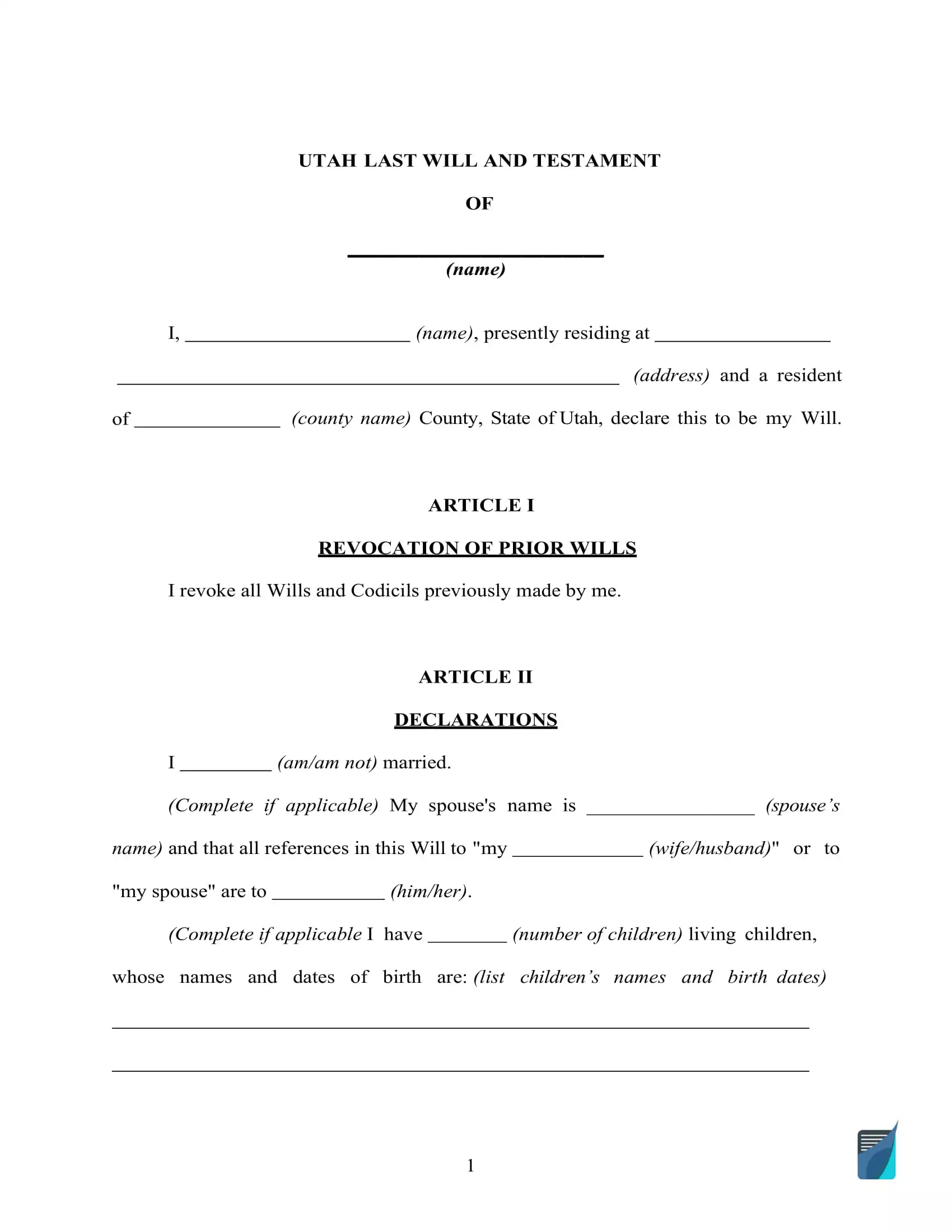
Build Your Document
Answer a few simple questions to make your document in minutes
Save and Print
Save progress and finish on any device, download and print anytime
Sign and Use
Your valid, lawyer-approved document is ready
Utah Last Will Laws and Requirements
| Requirements | State laws | |
| Statutes | Title 75 – Utah Uniform Probate Code; Chapter 2 – Intestate Succession and Wills | |
| Definitions | Section 201. General definitions | |
| Signing requirement | Two witnesses | 75-2-502. Execution — Witnessed wills — Holographic wills |
| Age of testator | 18 or older | 75-2-501. Who may make will |
| Age of witnesses | 18 or older | 75-2-505. Who may witness |
| Self-proving wills | Allowed | 75-2-504. Self-proved will |
| Handwritten wills | Recognized if meeting certain conditions | 75-2-502. Execution — Witnessed wills — Holographic wills |
| Oral wills | Not recognized | |
| Holographic wills | Recognized if meeting certain conditions | |
How to Write a Utah Last Will
1. Think about your possibilities. Before getting started, you might want to determine if you want to use the help of a legal professional or do the entire document on your own. In case you would like to create the will yourself, pick the type you’ll use: a handwritten will or a free last will and testament form.
2. Specify your information. Step one is establishing the testator by filling out their full name, as well as the residential information (city, county, and state). Review the information you entered as well as the rest of the section, which includes “Expenses and Taxes.”
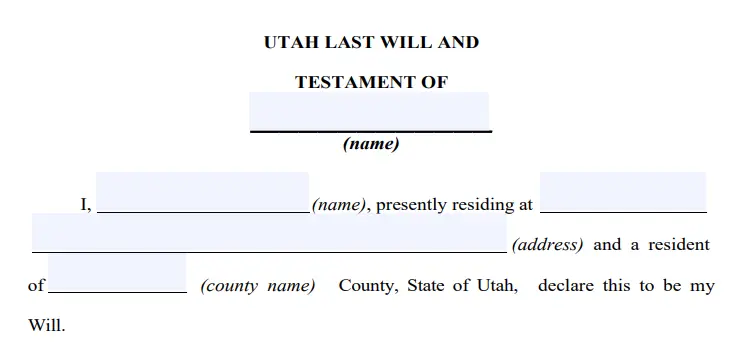
3. Choose the executor (or executrix). The next step is to decide on the executor of your will, the person in charge of making sure every little thing you write in this document is made a reality. To do that, you have to enter the executor’s full legal name, together with their residence details (city, county, and state). Be sure you appoint someone who lives in the same state as you do. Otherwise, there will be more paperwork and inevitable hassle involved in the process due to different special rules every state has with regards to out-of-state executors. It may happen that the primary representative won’t be able to carry out your will due to an illness, passing, disinclination, or some other reasons. In such a case, the court can appoint its own agent to carry out the duties. To avoid that, it is possible to decide on an alternative executor by indicating the same information you did for the primary one.
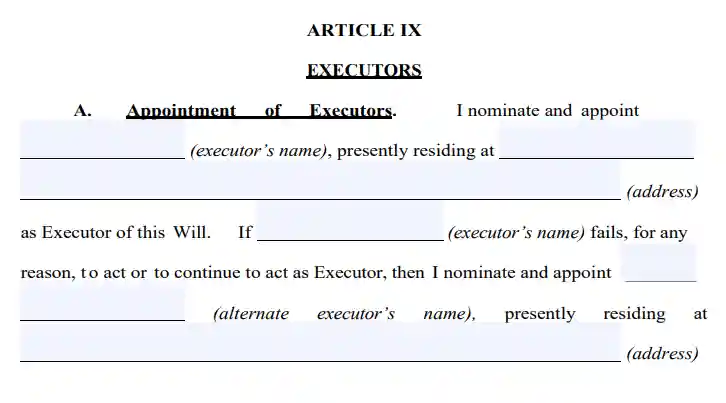
4. Determine the guardian (optional). It’s possible to choose a trusted person as a guardian in case you have underage or dependent children that need to be taken care of. In case there are no instructions pertaining to who exactly should take care of your children, the guardian will be appointed by the court.
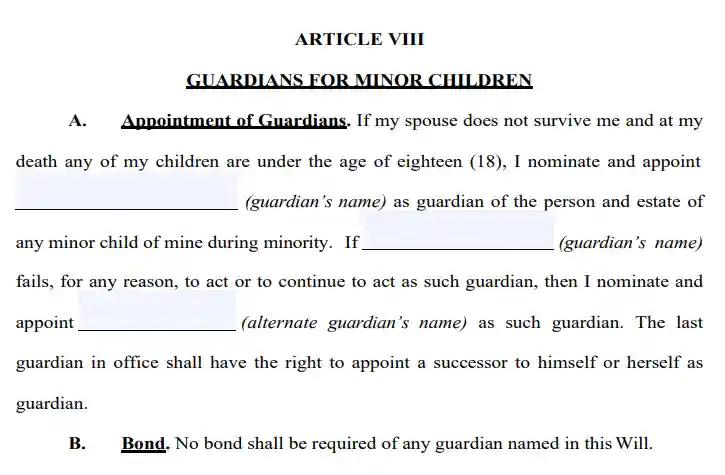
5. Indicate your beneficiaries. Now specify people to whom you’d like to hand your assets on, that is, your beneficiaries. For every beneficiary, indicate these particulars: full legal name, address, and the way they are related to you.
6. Assign property. List your property and describe the way you would like to distribute it to your inheritors if you’ve got something on your mind apart from dividing the assets commensurately. The property might include money for outstanding arrears, realty, shares, business control, cash, and any physical things of financial value you own. Nonetheless, joint and living will property, as well as your life insurance, can’t go in your last will and testament.
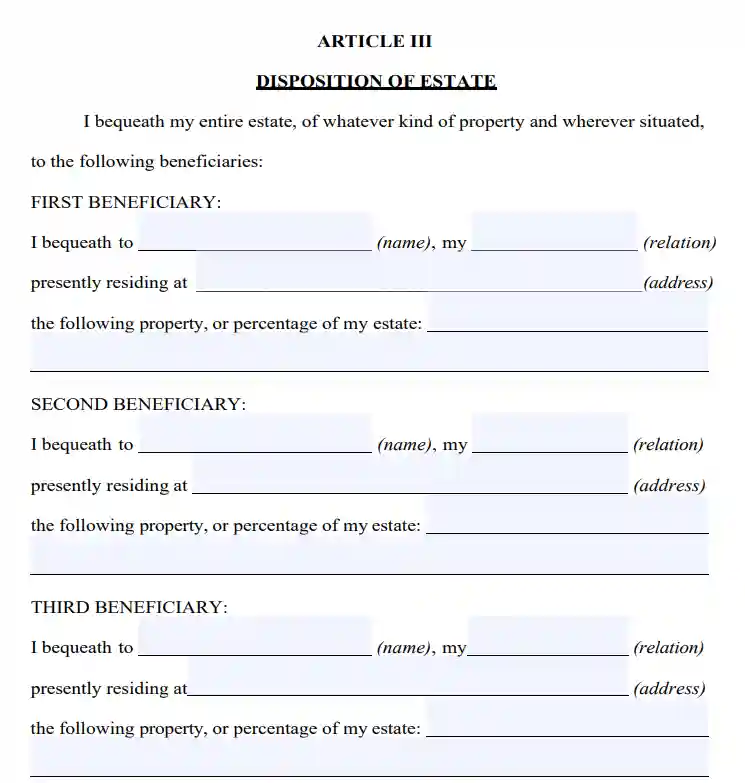
7. Continue with the witnesses signing the document. Utah Code stipulates that no less than two witnesses have to sign a last will and testament for it to be regarded as valid. They must be over 18 years of age and have no interest in your testament, which means that they cannot be inheritors. Think about picking witnesses who are younger than you to make sure that they will likely be around in case the will is contested in court or if any other problem takes place. Now, you (as well as your two witnesses) have to sign the paper after filling in your full legal addresses and names. Don’t forget to review every sentence carefully before finalizing the matter.
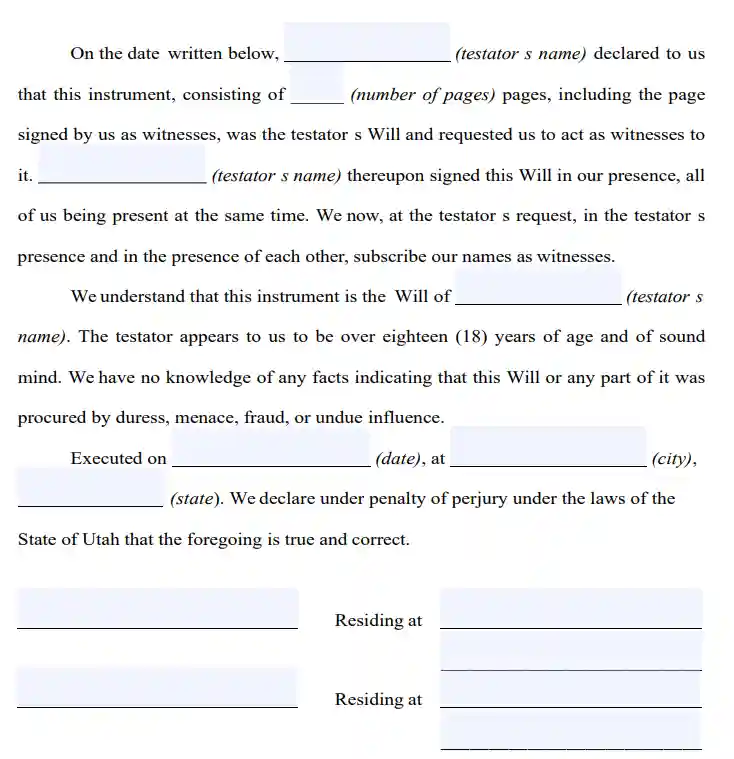
Get a Free Utah Last Will Template
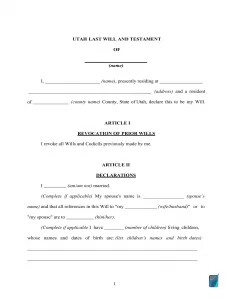

Frequently Asked Questions
Should I notarize my last will in Utah for it to be valid?
In Utah, it’s not necessary to attest your last will. However, following Utah Code §75-2-504, you can make your last will self-proving by attaching an affidavit to it. Then, you’ll have to go to a notary. Making your last will self-proving could be a good option because it expedites the probate and gives yet another layer of security in case the will’s validity is contested.
What's testamentary capacity?
Testamentary capacity is a term used to describe the testator’s legal and mental capability to write and change their last will. In most states, to write a will, you have to be of sound mind and at least 18 years old. “Sound mind” indicates that you do not have any kind of mental disorders (dementia, senility, insanity, etc.) that doesn’t allow you to have an understanding of the outcomes of your doings.
Is it possible to disinherit your child or spouse?
In Utah, there’s no such thing as community or marital property. This suggests that all assets acquired or improved during the marriage do not have to be evenly distributed between the marriage partners. However, because Utah law allows a surviving spouse an elective amount of the decedent’s estate, this makes disinheriting a spouse without their consent extremely difficult. Apart from your marriage partner, Utah law permits you to disinherit other members of your family. This refers to your adult children and relatives; just include disinheritance paragraphs to the last will and testament.
Is another person permitted to amend my last will?
No, only you can amend your will. There is just one situation when a third party can get involved. When you’re physically incapable of signing your will, another person can do it instead of you yet only in your presence.
If I'm physically incapable of signing my last will and testament, what do I have to do?
Utah Estate Code permits some other individual to sign your will solely per your directive and with you present. It’s possible to give a certain instruction using some methods that include verbal communication, a positive answer to a query, or body language.
You may have a notary to sign the name of a testator who is physically unable to do so in case the latter instructs the notary public in the presence of a witness. It is important to note that such witnesses can’t have an interest (equitable or legal) in any of the assets being the issue matter of or affected by this type of a document (the will).
| Related documents | Instances when you might need to make one |
| Codicil | There are several minor adjustments you wish to make to your last will. |
| Self-proving affidavit | You would like to save time and legal fees for your witnesses. |
| Living will | You want to establish what health care you expect if you’re unable to communicate that yourself. |
| Living trust | You would like to deal with your end-of-life affairs without probate. |
